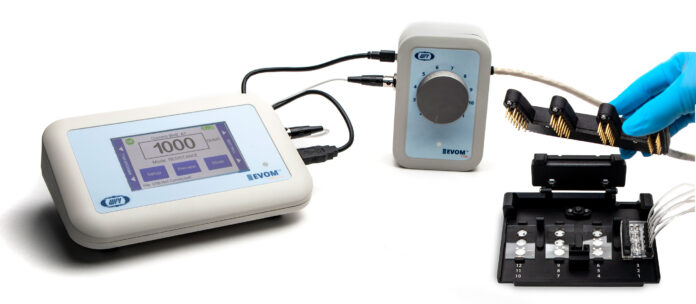Sarasota, Fla. & Huntsville, Ala.– World Precision Instruments (WPI) and SynVivo Inc. have jointly launched a next-generation multiplexed TEER-on-a-Chip platform, combining real-time transepithelial electrical resistance (TEER) measurement with advanced Organ-on-a-Chip (OOC) technology. The new system is designed to enhance the precision, reproducibility, and scalability of barrier integrity studies in biomedical research.
The co-developed platform integrates WPI’s well-established EVOM™ TEER technology with SynVivo’s SynTEER™ multiplexed OOC models, which include embedded electrodes for real-time, multi-channel data collection. The first product to debut under this collaboration is the EVOM-Chip™, a system capable of monitoring up to 12 channels simultaneously within microfluidic chip environments. It is initially validated on SynVivo’s SynBBB™, a Blood-Brain Barrier model.
With electrodes pre-integrated into the chip architecture, the new system allows researchers to perform non-destructive, continuous TEER measurements across multiple wells without disrupting live-cell imaging or physiologically relevant flow conditions. This hands-free approach supports barrier integrity monitoring from initial cell seeding through drug exposure and recovery, improving experimental efficiency and consistency.
Gwen Fewell, President and CEO of SynVivo, emphasized the platform’s potential impact on drug development and disease modeling. “Integrating TEER measurement directly into our chip enhances data fidelity, reduces variability, and streamlines workflows,” she said. “This enables more predictive and standardized in vitro models—critical for CNS drug development, inflammation studies, and broader pharmaceutical research.”
WPI CEO Mark Rutledge highlighted the significance of the platform in addressing long-standing challenges in the OOC field, particularly the lack of reliable, multiplexed, on-chip sensing solutions. “Most OOC systems lack non-invasive TEER measurement capabilities,” Rutledge noted. “The EVOM-Chip bridges this gap, offering accurate, reproducible readouts throughout the full course of experiments without compromising cell health.”
The initial application on SynVivo’s Blood-Brain Barrier model has shown a strong correlation between electrical resistance data and functional barrier properties. The companies plan to expand the technology to additional Organ-on-a-Chip models in the future, aiming to provide scalable tools for researchers seeking more robust and automated in vitro systems.
As demand grows for high-throughput, physiologically relevant research platforms, the partnership between WPI and SynVivo is positioned to help bring Organ-on-a-Chip technologies closer to mainstream adoption in pharmaceutical and biomedical research.


